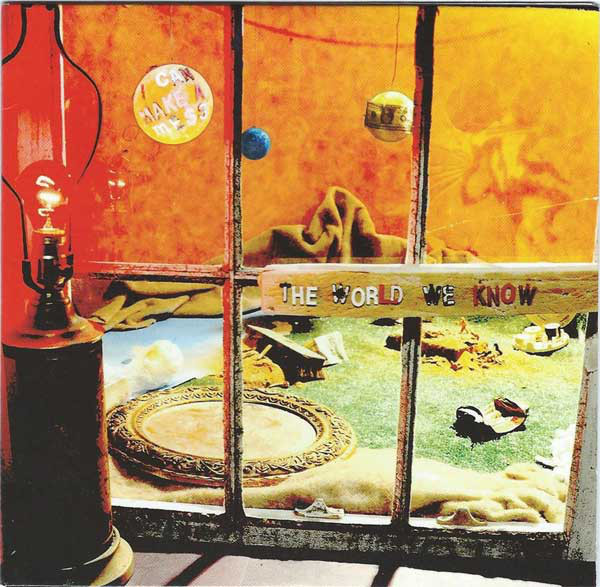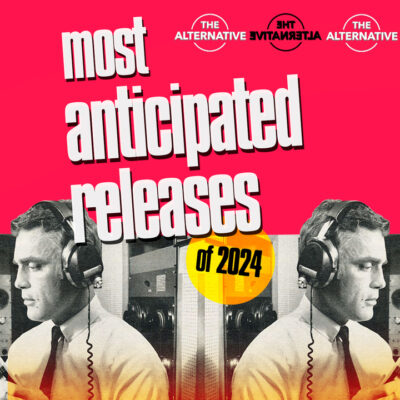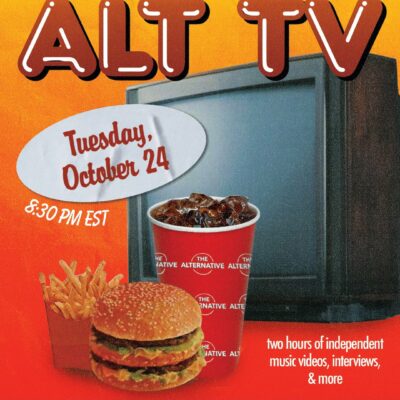It Holds Up: ‘The World We Know’ Turns 10
Posted: by The Editor
 In the days when Myspace still had the slightest edge on Twitter and Facebook when it came to music, when it was just starting to make sense, at least to me, that your favorite band could connect with you on their own terms, crafting a message that could frame your understanding of the songs by even pre-empting their existence, Ace Enders made a timid return with a single word. His return was to an old name, I Can Make a Mess Like Nobody’s Business, one that in 2009 seemed distant and contained, a book opened and closed and done with already. But The World We Know, a brilliant, ambitious album that turns 10 this month, was more than worth adding the extra chapter.
In the days when Myspace still had the slightest edge on Twitter and Facebook when it came to music, when it was just starting to make sense, at least to me, that your favorite band could connect with you on their own terms, crafting a message that could frame your understanding of the songs by even pre-empting their existence, Ace Enders made a timid return with a single word. His return was to an old name, I Can Make a Mess Like Nobody’s Business, one that in 2009 seemed distant and contained, a book opened and closed and done with already. But The World We Know, a brilliant, ambitious album that turns 10 this month, was more than worth adding the extra chapter.
When the I Can Make a Mess Like Nobody’s Business Myspace page returned out of the blue in 2009 with a single announcement—“Maybe”—Ace Enders still seemed to be in transition. After his main gig, The Early November, split up in 2007, Enders seemed amped up to keep his momentum going and to make a big claim as a solo artist.
But this period was filled with some false starts for Enders. A still-unheard album with a band called Kings For Queens was shelved. He started releasing music under the name “Ace Enders and a Million Different People,” all of which pleaded to be played in big rooms but produced mixed results. A blah “Bittersweet Symphony” cover, which for some reason graced a lot of my Pandora radio stations during this period, was balanced out by a wonderful little pop-rock EP The Secret Wars, which was released for free on—wait for it—fuse.tv to not much fanfare. The subsequent LP When I Hit The Ground, oddly co-released by Vagrant Records and the collapsing Drive-Thru Records, is a mixed bag of fantastic, exciting tracks (“Reintroduction,” “Take the Money and Run”) filed in-between some vaguely ‘80s stadium-rock attempts (“The Only Thing I Have,” “Can’t Run Away”) and some other earnest experiments that read a little bit on the corny side (although I’m still hoping we’re due to “Bring Back Love” some time this year).
Given the direction Enders seemed to be heading with A Million Different People, the announcement of the songwriter’s return to I Can Make a Mess was surprising. The only release under the name, the 2004 album I Can Make a Mess Like Nobody’s Business, had a similar scope as When I Hit The Ground, but the former LP took a wildly different approach. Enders’s experiments with the self-titled I Can Make a Mess album are less about leaping across genres and more about taking the songwriting style that he defined with The Early November and stretching it out, twisting it around, and seeing what it might look like from another angle. The songs on I Can Make a Mess go down meandering rabbit-holes (“End of Background Noise”), they try on new, darker textures (“The Kindler Burns,” “I Know the Sum and Substance of My Evil”), they attempt mirrored experiments on the same themes (“So I Finally Decided to Give Myself a Reason,” “Timshel”).
If it sounds like a mess, that’s because it is. It’s in the name. I Can Make a Mess Like Nobody’s Business is just bursting at the seams with ideas, but at the same time, it feels strangely self-contained. On that record, Enders splashed paint in all different directions across a canvas, but it all stayed on the canvas. I Can Make a Mess is a small, intimate record that lives in its own little world.
The last thing that Enders released under the A Million Different People name was, in retrospect, a bridge back to that world. Released in 2009 for that band’s shows in Australia, the mostly acoustic Australian EP was uncharacteristically quiet for A Million Different People. Three of the four songs on that limited release would be co-opted for I Can Make a Mess, but it was “Open Windows” that made the transition first. Posted to the I Can Make a Mess Myspace page not too long after that initial “Maybe” message, “Open Windows” had been around for a little bit for people willing to track it down, but it still made a lot of sense when it was recasted for I Can Make a Mess’s return. It hinges on the lyric “I’m hoping to notice a window that I don’t want to close/where do you want to go?” “Open Windows” doesn’t need stadium sheen to reach the rafters, instead, it makes do with what little tools it has at its disposal—Enders, with his powerful voice bleeding strange, aimless hope, makes this song enormous. It’s as good a reintroduction as I can think of.
But “Open Windows” didn’t serve to announce the second I Can Make a Mess LP, The World We Know, on which it would only appear as a bonus track. That duty rightfully went to “Old Man…,” an ambitious and melancholy track that loops and whirrs in deep, transcendent longing. “Old Man…” is possibly the best song that Enders has ever released, building peacefully toward an inevitable, cathartic final act. Accompanying the MySpace premiere of “Old Man…” was a video in which Enders demonstrated how he would play the song all by himself using loop pedals, immediately defining The World We Know as an intimate, lonely affair. Indeed, “Old Man…,” in part, seems to be about an intrinsic need to create, even when it felt like nobody would be around to listen (“I’ve got the lines if you’d like to hear it, I can’t decide if you’d like to be there too”).
When The World We Know was announced, Enders talked about how he wrote the album to flow together as if it were one song. While there are moments where this claim holds water, like the seamless, waking-up-from-a-dream-like transition from “Old Man…” into “You’re No Good at Talking Anymore,” The World We Know doesn’t often mesh together quite in that way, other than basically playing out like an album with very good flow and sequencing. Still, the album was mistakenly released on Amazon as a single-track download a few days before the official street date, and so my first week with The World We Know will always be remembered as the ones I spent memorizing the time stamps on the one 45-minute track I had on my iPod.
And while it may not exactly feel like one song, The World We Know does sort of make sense as a contained, isolated piece of work. Listening to this record can often feel like you’re walking through a dimly lit, lived-in home, each room haunted by past elations, hopes, and failures. The opening “Sleep Means Sleeping” starts off especially comfortable in this way, bringing back the background television sounds that lurked throughout the self-titled record before slowly, dazedly coming to life in a fit of anxiety. The tenderly unfurling track is a far cry from the straightforward pop-rock tendencies of A Million Different People, but “Sleep Means Sleeping” is immediate in a different way—it evolves in a natural, intoxicating cadence, building toward an ambiguous chant (“if lightning strikes this place again…”) that feels jarring, wondering “how did we get here?” It’s like waking up to a sinking feeling, and the rest of The World We Know works to figure out what exactly to do with that feeling.
As such, The World We Know is often a downtrodden, weary record, with songs like “My Hands Hurt” that fixate on debt and responsibility. Here, Enders sounds as tired as he ever has, the opening “please” so aching and alone it seems to suck the life out of the room. Enders was a new father at the time and had turned to self-releasing for the first time in his career, and here, alone in his studio, he laid bare all the fear and pressure he was feeling in real time. The effect is powerful and lasting.
But where one room might be filled with dim hopelessness, another might hold euphoric hope. “You’re Not So Good at Talking Anymore” bursts with exuberance like a dance in the snow. It’s similar to Jimmy Eat World’s “Clarity” in the way it yearns for change and motion in a moment of feeling stuck. And when Enders yells with all his might “I’m ready, waiting on my ending,” it really feels like an act of defiance against the fear he couldn’t shake just two songs ago. In a similar vein, “Stop Smoking Because It’s Not Good For You” bounces with sentimentality, reaching a hand out of the lonely space in which this album lives and asking for mutual rebellion against hopelessness—“you say life has got you down/steady course, we’re breaking out.”
These emotional highs find a plateau in some of the more clear-headed songs on the record. “Baby Steps,” another song that first saw the light of day on the Australia EP, is awash in a foggy, string-laden glow. Keeping a low, steady profile until Enders begins calmly raising his voice, pleading “come on now, baby, step right out,” “Baby Steps” builds confidence in the same way it preaches moving forward—in tiny increments.
Just as the album begins with a gradual waking into a daily, anxious reality, the closer, “Telling Me Goodbye,” sounds like the big regrets you might ruminate on as you try to lull yourself to sleep at night. This is a song about grief and the way it makes us obsess over the things we can’t change—here, a conversation with a loved one is rushed to a conclusion, an everyday kind of interaction that takes on enormous weight when that loved one passes away. It’s something that’s easy to turn over again and again in isolation, the regret and the anger getting bigger and bigger with each replay. This is how “Telling Me Goodbye” develops, starting off mournful and tepid before launching into a big ending. In these final, restless moments, the song takes on a theatrical quality as each delivery of “never say goodbye” brings the music up a notch in terms of intensity. In the end, the song fades out, the sound of Enders still repeating “never say goodbye” getting further and further away, falling into the kind of sleep that tosses and turns until a bleary morning comes.
The songs on The World We Know are some of the most evocative that Enders has ever written—they still feel vital and true 10 years later. While this is far from the most successful or well-known record in Ace’s catalogue, it’s one that definitely has its die-hards. It’s a hidden gem in his discography, and indeed the introverted yet quietly adventurous nature of The World We Know makes it feel like the purest distillation of his strengths as a songwriter. Maybe as a result of this, the records that came directly after—the dreamy and gorgeous covers album Dustin’ off the Ol’ Guitar, the groovy, singular Gold Rush, and the loud and powerful return to The Early November In Currents—all feel settled and assured.
Ace Enders will return to I Can Make a Mess for the first time in five years this week with a live performance of the self-titled record. While I definitely believe that’s a record worth celebrating, it’s important to me that The World We Know not get forgotten. I try to remember how 15-year-old me felt, scanning through a single 45-minute track to find just the right song, when he fell in with a record as insular and worried as this, but I don’t think I really dwelled all that much on the anxiety that haunts many of these songs. When I remember most was the feeling that with The World We Know, Enders had created something out of necessity for himself. These felt like songs he couldn’t help but write, and while that’s true of probably millions of other artists, to me, at 15, that was everything. So when I think about 2009, when Enders posted “maybe” as a means of stepping back into old shoes, I think it’s kind of funny, because the songs on The World We Know don’t feel like they were up for debate. Instead, they feel inevitable.
_
Jordan Walsh | @jordalsh
The Alternative is ad-free and 100% supported by our readers. If you’d like to help us produce more content and promote more great new music, please consider donating to our Patreon page, which also allows you to receive sweet perks like free albums and The Alternative merch.










